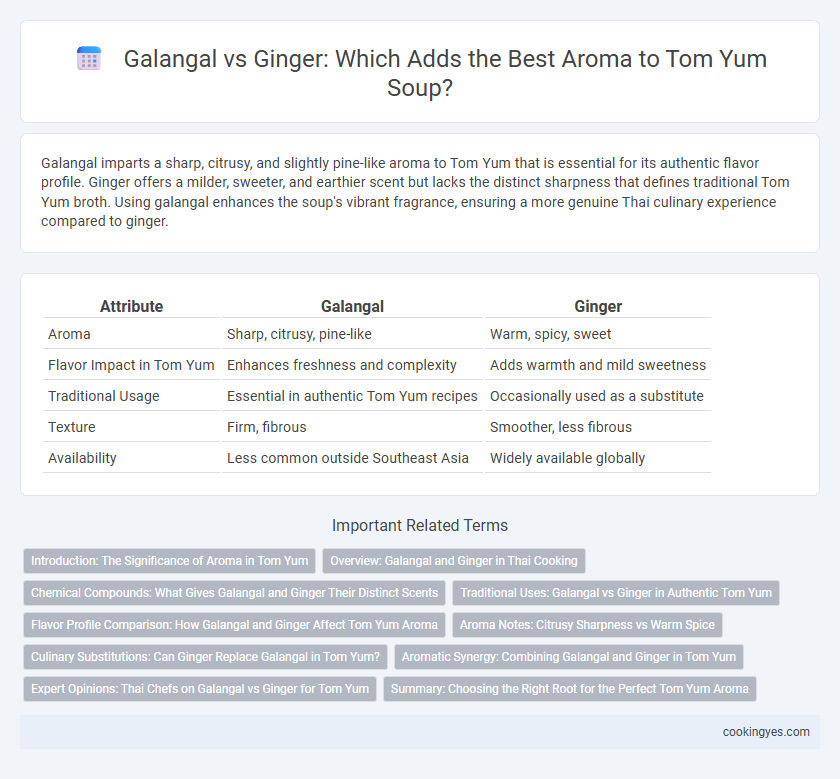Galangal imparts a sharp, citrusy, and slightly pine-like aroma to Tom Yum that is essential for its authentic flavor profile. Ginger offers a milder, sweeter, and earthier scent but lacks the distinct sharpness that defines traditional Tom Yum broth. Using galangal enhances the soup's vibrant fragrance, ensuring a more genuine Thai culinary experience compared to ginger.
Table of Comparison
| Attribute | Galangal | Ginger |
|---|---|---|
| Aroma | Sharp, citrusy, pine-like | Warm, spicy, sweet |
| Flavor Impact in Tom Yum | Enhances freshness and complexity | Adds warmth and mild sweetness |
| Traditional Usage | Essential in authentic Tom Yum recipes | Occasionally used as a substitute |
| Texture | Firm, fibrous | Smoother, less fibrous |
| Availability | Less common outside Southeast Asia | Widely available globally |
Introduction: The Significance of Aroma in Tom Yum
Galangal and ginger both contribute distinct aromas essential to the authentic flavor profile of Tom Yum soup, with galangal offering a sharp, citrusy, and pine-like fragrance, while ginger provides a warm, spicy, and slightly sweet scent. The unique, aromatic qualities of galangal are more traditionally favored in Tom Yum recipes for their ability to complement lemongrass and kaffir lime leaves, enhancing the soup's characteristic bright and refreshing aroma. Selecting galangal over ginger intensifies the depth and complexity of Tom Yum's signature fragrance, making it indispensable for achieving a truly authentic sensory experience.
Overview: Galangal and Ginger in Thai Cooking
Galangal and ginger are essential roots in Thai cooking, each contributing distinct aromas and flavors to Tom Yum soup. Galangal offers a sharp, citrusy, and earthy fragrance that defines the authentic taste of Tom Yum, while ginger provides a milder, sweeter, and slightly peppery note. The unique pungency of galangal enhances the spicy and sour profile of Tom Yum, making it the preferred choice over ginger for achieving the soup's signature aroma.
Chemical Compounds: What Gives Galangal and Ginger Their Distinct Scents
Galangal contains high levels of 1,8-cineole and pinene, which impart a sharp, pine-like aroma essential to Tom Yum's signature scent. Ginger's primary compounds, gingerol and shogaol, provide a warm, spicy fragrance but lack galangal's fresh, citrusy notes. The unique interplay of galangal's terpene-based aroma makes it irreplaceable for authentic Tom Yum flavor.
Traditional Uses: Galangal vs Ginger in Authentic Tom Yum
Galangal distinguishes itself from ginger in Tom Yum through its sharper, citrusy aroma and peppery undertones, essential for authentic Thai flavor profiles. Traditionally, galangal is used in Tom Yum to impart a complex, aromatic depth that ginger cannot replicate due to its milder, sweeter fragrance. The unique pungency of galangal enhances the broth's freshness and balance, making it indispensable in genuine recipes over ginger's subtler warmth.
Flavor Profile Comparison: How Galangal and Ginger Affect Tom Yum Aroma
Galangal imparts a sharp, citrusy, and slightly piney aroma to Tom Yum, enhancing its traditional bright and spicy character, while ginger offers a warmer, earthier, and slightly sweet scent that adds depth but less vibrancy. The distinct aromatic oils in galangal contribute to the soup's signature zesty freshness, making it essential for authentic Tom Yum flavor, whereas ginger provides a milder, more rounded warmth that complements but does not dominate the broth. Choosing galangal over ginger creates a more pronounced, layered flavor profile that defines classic Tom Yum aroma, highlighting its uniquely pungent and invigorating essence.
Aroma Notes: Citrusy Sharpness vs Warm Spice
Galangal imparts a bright, citrusy sharpness to Tom yum, enhancing its fresh and zesty aroma profile. Ginger provides a warm, spicy undertone that adds depth and a subtle heat, complementing the soup's richness. The choice between galangal and ginger influences the soup's aromatic clarity and complexity, where galangal emphasizes vibrant citrus notes while ginger offers comforting warmth.
Culinary Substitutions: Can Ginger Replace Galangal in Tom Yum?
Galangal and ginger share similar spicy and citrusy notes but galangal offers a sharper, more pine-like aroma crucial to authentic Tom Yum flavor. While ginger can be used as a culinary substitution in Tom Yum soup, it lacks the distinct floral undertone and slightly peppery taste that galangal provides. For the best aromatic profile, preserving galangal is recommended, although ginger can offer a close alternative when galangal is unavailable.
Aromatic Synergy: Combining Galangal and Ginger in Tom Yum
Galangal and ginger together create a complex aromatic synergy that enhances the signature fragrance of Tom Yum soup. Galangal offers a sharp, citrusy, and pine-like aroma, while ginger contributes warm, spicy, and slightly sweet notes, resulting in a balanced and layered scent profile. This combination intensifies the soup's freshness and depth, making the flavor more vibrant and memorable.
Expert Opinions: Thai Chefs on Galangal vs Ginger for Tom Yum
Thai chefs unanimously emphasize galangal over ginger in Tom Yum for its distinct citrusy and pine-like aroma, which defines the soup's authentic flavor profile. Galangal's sharp, peppery notes complement the spicy and sour elements more effectively than ginger, which some consider too sweet and mellow for this dish. Experts assert that substituting ginger diminishes the signature fragrance and complexity that characterize traditional Tom Yum.
Summary: Choosing the Right Root for the Perfect Tom Yum Aroma
Galangal delivers a sharp, citrusy, and slightly piney aroma essential to authentic Tom Yum, creating a distinctive flavor profile traditional in Thai cuisine. Ginger, while adding warmth and a mild spiciness, lacks the unique herbal brightness that galangal imparts. Selecting galangal over ginger ensures the perfect balance of aromatic intensity and authenticity characteristic of classic Tom Yum broth.
Galangal vs ginger for Tom yum aroma Infographic

 cookingyes.com
cookingyes.com